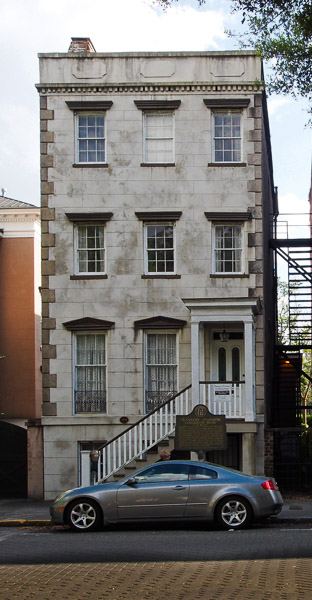 Flannery O'Connor Childhood Home
Flannery O'Connor Childhood Home
Flannery O'Connor Childhood Home
 Flannery O'Connor Childhood Home
Flannery O'Connor Childhood Home
Flannery O'Connor Childhood Home
Savannah, GA 31401
Hours:
Friday - Wednesday: 1:00p - 4:00p
Closed Thursdays & major holidays
Built in 1856, Savannah's Historic Flannery O'Connor Childhood Home was the birthplace and childhood home of Flannery O'Connor, one of the country's outstanding writers. Born Mary Flannery O'Connor in 1925, Flannery lived in the house, then a modest one-story home until 1938. Flannery's childhood was spent in the Lafayette Square house just one block over from St. John the Baptist Cathedral which provided the cornerstone of her Catholic faith. She once called Savannah "a colony of the Over-Irish" and her ancestry included two of Georgia's oldest Catholic families, the O'Connors of Savannah and the Clines of middle Georgia (her Mother's side). She died of lupus erythematosus when she was only 39, the same disease that had claimed her father in 1941.
The 19th century Greek revival townhouse where Flannery lived has undergone major renovations. The top two floors and the basement are apartments. The living room on the "parlor level" floor is open to the public. It contains twin fireplaces and beautiful chandeliers has been refurbished. The heart-of-pine floors, heavy furniture and lace curtains are reminiscent of the period when it was home to the O'Connor family. The walled garden was added in 1993. It was in the back yard that 5-year-old Mary is said to have taught a chicken to walk backwards.
One of her trademark techniques in her writing is foreshadowing, giving a reader an idea of what will happen far before it happens. Most of her works feature disturbing elements, though she did not like to be characterized as cynical.
O'Connor wrote two novels and 32 short stories, as well as a number of reviews and commentaries. She addressed the Holocaust in her famous story "The Displaced Person," and racial integration in "Everything That Rises Must Converge." O'Connor's fiction often included references to the problem of race in the South; occasionally, racial issues come to the forefront, as in "The Artificial Nigger," "Everything that Rises Must Converge," and "Judgment Day".
O'Connor was the first fiction writer born in the twentieth century to have her works collected and published by the Library of America.

